Aristocracy of Deceit

Opening Line from Declaration of Independence by Thomas Jefferson
Thomas Jefferson chose as the opening line to The Declaration of Independence the words:
We hold these truths to be self-evident, that all men are created equal, that they are endowed by their Creator with certain unalienable Rights, that among these are Life, Liberty, and the Pursuit of Happiness.
In the 1940s, George Orwell published the book Animal Farm in which he made a clever reference to these words of Jefferson. What is interesting is that Orwell wrote his political satire as an attack on communism, but the literary reference of what is perhaps the most famous line in his book points back to America’s founding document. Indeed, the entire plot of Animal Farm could very well be the story of America.
In Orwell’s book a group of animals revolt against the farm’s owner who is a severe alcoholic. The farmer, a Mr. Jones, neglects to feed and care for the farm animals so they run him off of the farm. Although Orwell may not have intended this association, there is a parallel found here between the colonialists of America who banded together to overthrow the rule of the King of England whom they accused of mistreating them.
Old Major, the old boar on the Manor Farm, calls the animals on the farm for a meeting, where he compares the humans to parasites and teaches the animals a revolutionary song, ‘Beasts of England.’ When Major dies, two young pigs, Snowball and Napoleon, assume command and turn his dream into a philosophy. The animals revolt and drive the drunken and irresponsible Mr. Jones from the farm, renaming it “Animal Farm.” They adopt Seven Commandments of Animal-ism, the most important of which is, “All animals are equal.”
[Source: http://en.wikipedia.org/wiki/Animal_Farm]
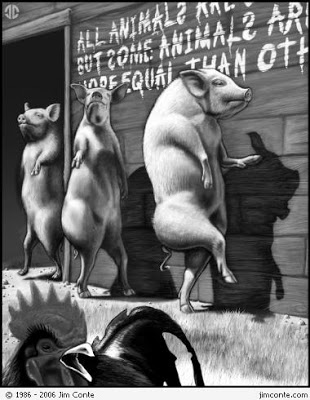
Animal Farm
I question whether Orwell did not secretly have America in mind when he wrote this book. After all, America’s conflict was with England, and the most important commandment of the animals does not derive from the founding documents of Communist Russia, but from The Declaration of Independence of America.
The application to America becomes more apparent as the book progresses. The animals, having driven out Mr. Jones, set up their own government based upon a type of Constitution that includes a Bill of Rights. These rights are seven in total.
1. Whatever goes upon two legs is an enemy.
2. Whatever goes upon four legs, or has wings, is a friend.
3. No animal shall wear clothes.
4. No animal shall sleep in a bed.
5. No animal shall drink alcohol.
6. No animal shall kill any other animal.
7. All animals are equal.
Over time, one of the pigs (Napoleon) begins taking the pups away from the dogs when they are born and trains them as his personal protection force. Napoleon then drives away Snowball, wresting control of the farm to himself. He ends the full community meetings of the animals and sets up a committee of pigs that will govern the farm. Napoleon begins to take the best food and supplies of the farm for his personal use, and that of the other pigs, while also altering the laws to benefit his committee. Following are some of the changes enacted to the original seven commandments.
“No animal shall sleep in a bed,” becomes “No animal shall sleep in a bed with sheets.”
“No animal shall drink alcohol,” is changed to “No animal shall drink alcohol to excess.”
“No animal shall kill any other animal,” becomes “No animal shall kill any other animal without cause.”
Yet, the greatest change, and most noteworthy, is that “All animals are equal” is restated as “All animals are equal, but some animals are more equal than others.”
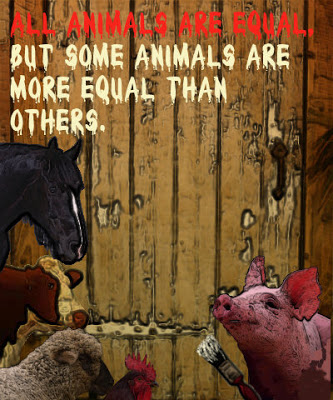
Some Animals Are More Equal Than Others
As I have studied the history of America, I have observed that this last tenet has been in evidence among American government ever since its founding as a nation separate from England. Some months back I read the book The Secret Destiny of America by Manly P. Hall. Manly Hall is a Masonic author greatly admired by men of the lodge. In 1944 he published the aforementioned book, setting forth a case for America fulfilling her destiny as “the new Atlantis.”
Manly Hall makes reference to the writing Critias that was authored by the Greek philosopher Plato in the fourth century B.C.. In Critias Plato imagines a dialogue between Socrates and a man named Critias, who was named as a descendant of the Greek politician Solon. Critias is telling Socrates of a trip made by his forebear to Egypt, where Solon was shown mysteries by the Egyptian priests who guarded the wisdom of that ancient nation. What Solon was shown related to the lost kingdom of Atlantis.
What stood out to me in Manly Hall’s review of this ancient writing was the claim that Atlantis was ruled over by “philosopher kings.” These were men who had achieved an illumined state through self-discipline and self-improvement. They were also learned in ancient wisdom, and these qualities commended these men as nature’s only true aristocracy. It was suggested by Manly Hall that certain men reach a state of moral and philosophical advancement that sets them apart from the common man as being worthy of ruling over others.
THE destruction of Atlantis, as described by Plato in “Critias,” can be interpreted as a political fable. The tradition of the Lost Empire as descended from Solon was enlarged and embellished according to the formulas of the Orphic theology; but it does not follow necessarily that Plato intended to disparage the idea that a lost continent had actually existed west of Europe. Plato was a philosopher; he saw in the account of the fall of Atlantis an admirable opportunity to summarize his convictions concerning government and politics.
“Critias” first describes the blessed state of the Atlantean people under the benevolent rulership of ten kings who were bound together in a league. These kings were monarchs over seven islands and three great continents. From the fable we can infer that the ten rulers of the Atlantic league were philosopher kings, endowed with all virtues and wise guardians of the public good. These kings obeyed the laws of the divine father of their house, Poseidon, god of the seas…
In this way Plato describes the government of the Golden Age, in which men live on earth according to the laws of heaven.
By the three great continents of Atlantis are to be understood, Europe, Asia, and Africa; and by the seven islands, all the lesser peoples of the earth. The league of the ten kings is the cooperative commonwealth of mankind, the natural and proper form of human government. The Atlantis, therefore, is the archetype or the pattern of right government, which existed in ancient days but was destroyed by the selfishness and ignorance of men.
Plato, it must be remembered, was a monarchist by philosophic conviction, but his ideal king was the wise man perfect in the virtues and the natural ruler of those less informed than himself. This king was the father of his people, impersonal and unselfish, dedicated to the public good, a servant of both the gods and his fellow men. This king was descended of a divine race; that is, he belonged to the Order of the Illumined; for those who come to a state of wisdom then belong to the family of the heroes – perfected human beings.
Plato’s monarchy was therefore a philosophic democracy; for all men had the right to become wise through self-discipline and self-improvement. One who achieved this state was by virtue of his own action a superior man, and this superiority was the only aristocracy recognized by Natural Law.
[Source: The Secret Destiny of America, Manly P. Hall]
What Manly P. Hall describes here is a manifestation of Masonic theology. Freemasonry claims to exist to “make good men better.” The various degrees of Masonry are displayed as a ladder, signifying man’s advancement toward godhood.
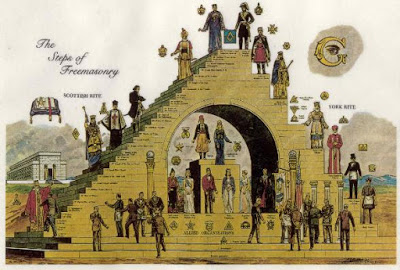
Steps of Freemasonry
This mythos of Freemasonry is not some obscure idea. It is well known by those who have founded and perpetuated America’s government. We saw in the Apotheosis of Washington, painted on the interior of the Capitol Dome, the belief that men can attain to godhood by self-discipline and self-improvement. Freemasonry purports to be the guardian of this method of self-improvement, and the guardian of all secret wisdom that men lack. At the top of the Masonic pyramid is the all-seeing eye, representing not only Lucifer, but those elite men who attain to godhood through Luciferian means. Satan’s first lie to mankind was “You shall be as God.” This is a lie he has not deviated from in his long career.
Although not all the men involved in the formation of America as a nation were Freemasons, one common thought held among them was that there are various classes of men. There is the rabble who are incapable of governing themselves, and there are those who are enlightened. Thomas Jefferson was an adherent to the philosophy of The Enlightenment. Manly Hall, writing as a Freemason, spoke of “the Order of the Illumined.” Although different in form, both The Enlightenment and Freemasonry have the same author. They both hold to a view that certain men are by virtue of their wisdom and moral virtues qualified to govern, while the vast majority of mankind needs to be governed, and true power must be withheld from them. This philosophy is not unlike Orwell’s description of the pigs’ attitude in the book Animal Farm declaring that some animals (pigs in particular) are more equal than others.
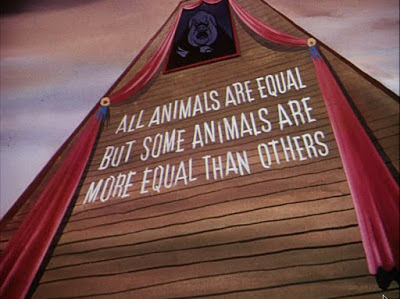
I found the above graphic online quite appropriate as it incorporates the figure of a pyramid, with an opening at the top where one might commonly see the all seeing eye. In the window is a pig who has determined that he is better than others, and has the divine right to rule over lesser creatures. Surely Yahweh sees the lies of Satan, the deceptions of Freemasonry, the delusions of the Illuminati, and the pride of the proponents of a New World Order in a similar fashion.
As I was preparing for this series of writings I became acquainted with a book titled An Economic Interpretation of the Constitution of the United States by Charles A. Beard. This book, originally published in 1913, the same year that the Federal Reserve Act was passed (which strikes me as an interesting “coincidence”), sets forth an articulate, clearly argued, and meticulously documented case that America’s Constitution was written by men of property and substance to give them specific advantages and protections from the rest of the American population. Having read the book, I am persuaded that the author’s viewpoint is correct. At the end of the book there is a section where he sums up the book’s major points. I will paraphrase since some of the language used by the author is archaic, or obscure.
Conclusions
The people involved in the design and adoption of the U.S. Constitution can be divided into four economic groups: banking, public securities, manufacturing, and trade and shipping.
The first firm steps toward the formation of the Constitution were taken by a small and active group of men who were motivated by personal financial and property interests.
The framing of the Constitution was not a democratic process.
A large percentage of the American population who lacked property, was excluded from having any input into the formation of the Constitution by voting qualifications that were in force in a majority of the states. A man could not vote unless he paid a certain amount of taxes, or owned a specific amount of land, in most of the states.
The members of the Philadelphia Convention which drafted the Constitution were, with few exceptions, immediately, directly, and personally interested in, and derived economic advantages from, the establishment of the new system.
The Constitution was ratified by a vote of probably not more than 1/6th of adult males in the existing states.
Historical evidence reveals that the voters of New York, Massachusetts, New Hampshire, Virginia, and South Carolina did NOT approve the ratification of the Constitution, but state representatives with financial interests approved it anyway.
During the ratification process for the Constitution, it became clear that the moneyed and propertied classes supported it, while the small farmers and debtors (a majority of the American population) opposed it. Many of this latter group were unable to vote due to voting qualifications that favored those with property and money.
[End Summary]
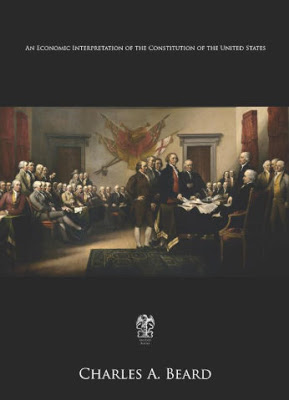
What Charles Beard’s book reveals is that America’s government has never been in the hands of the common man, nor was the Constitution written to give every citizen of the nation equal rights. This document was formed primarily to protect the propertied classes from the rabble, and to give them distinct advantages upon its passage.
One of the means by which the men gathered at the Constitutional Convention stood to gain financially was related to land scrip, a form of payment issued by the Federal government to pay soldiers during the war, and for payment of government debts. America had vast tracts of western land that had not been developed, and the government being short on cash, offered land scrip in its stead. This land scrip was worth only what it could be sold for. As long as the Native American Indians remained a threat (legitimately so, for they were having their lands forcibly wrested from them), and settlement and development of the land was delayed, the scrip was worth only pennies an acre.
Many soldiers after the war needed money and sold their scrip for a pittance to speculators who bought it up in anticipation of its value rising. The men speculating in this land scrip foresaw that once a strong Federal government was in place that the value of this Scrip would greatly increase. A strong federal government could raise a standing army to fight the Indians, and promote settlement of these western lands. Beard writes, “Every leading capitalist of the time thoroughly understood the relation of a new constitution to the rise in land values beyond the Alleghenies.”
Charles Beard proceeds in his book to show from existing records, the financial condition of each man that participated in the Constitutional Convention, and how they stood to gain financially, or materially, through passage of this document. Beard sums up this lengthy section of his book with the following statements:
The overwhelming majority of its members, at least five-sixths, were immediately, directly, and personally interested in the outcome of their labors at Philadelphia, and were to a greater or less extent economic beneficiaries from the adoption of the Constitution.
1. Public security interests were extensively represented in the Convention. Of the fifty-five members who attended, no less than forty appear on records of the Treasury Department…
2. Personal assets invested in lands for speculation was represented by at least fourteen members…
3. Personal assets in the form of money loaned at interest was represented by at least twenty-four members…
4. Personal assets in mercantile, manufacturing, and shipping lines was represented by at least eleven members…
5. Personal assets in slaves was represented by at least fifteen members…
It cannot be said, therefore, that the members of the Convention were “disinterested.” On the contrary, we are forced to accept the profoundly significant conclusion that they knew through their personal experiences in economic affairs the precise results which the new government that they were setting up was designed to attain.
[End Excerpt]
Beard proceeds to set forth cogent arguments for the design of the government. He presents a convincing view of the separation of powers as a means by which the moneyed and propertied classes could protect themselves against the popular will of the people. By separating the government into Executive, Legislative, and Judicial branches, and by staggering the election of public officials (Representatives – 2 years; Senators – 6 years; President – 4 years; Supreme Court – Lifetime Appointment), the Convention members were insuring that a sudden popular uprising against the moneyed and propertied classes would be stymied. It would be nearly impossible to pass any sweeping reforms that would adversely effect that aristocratic class of Americans who were men of money and property.
Keep in mind that many of these men at the Convention were Freemasons. There was a prevailing conviction among them (expressed in the words of Manly Hall) that certain men were born to govern, and the majority of men must in turn be content to be governed by others. Charles Beard writes of the “notions of government which were common to the Federalists” at that time. One of the Convention members was George Clymer who asserted that “a representative of the people is appointed to think FOR and not WITH his constituents.”
James Madison took detailed notes of the Convention and recorded the following about John Dickinson of Delaware. “Mr. Dickinson had a very different idea of the tendency of vesting the right of suffrage in the freeholders of the country. He considered them as the best guardians of liberty; And the restriction of the right to them as a necessary defense against the dangerous influence of those multitudes without property and without principle, with which our Country like all others, will in time abound.”
The men who participated in the Convention by and large were opposed to “leveling democracy.” They believed that it was dangerous for the unpropertied classes to have equal say as those with property. Many of the convention members wanted to establish a property clause in the Constitution whereby only those with significant property could vote. The reason such a restriction did not find its way into the Constitution is that the members never could come to agreement on what those requirements should be. The sticking point was that some of the men present had large land holdings, but very little actual cash or stocks or bonds. Others were flush with cash and various financial instruments, but had little in the way of real property. In the end, they chose to leave it to the states to establish voting qualifications, which most had in place already.
In his book, Beard cites Alexander Hamilton:
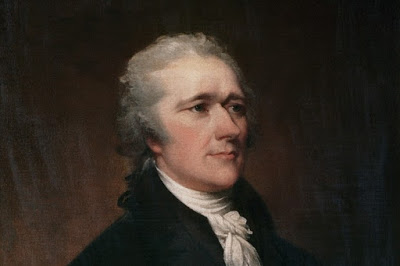
All communities divide themselves into the few and the many. The first are the rich and well born, the other the mass of the people. The voice of the people has been said to be the voice of God; and however generally this maxim has been quoted and believed, it is not true in fact. The people are turbulent and changing; they seldom judge or determine right. Give therefore to the first class a distinct, permanent share in the government. They will check the unsteadiness of the second…
There were numerous members of the Constitutional Convention who argued that a permanent aristocracy should be built into America’s government. Some made reference to the House of Lords in England, and suggested that America should have something similar. A few, however, were opposed to giving power to an aristocracy. Governeur Morris of Pennsylvania weighed in on the issue. He said:
The sound of (the word) Aristocracy, therefore had no effect on him. It was the thing, not the name, to which he was opposed, and one of his principal objections to the Constitution as it is now before us, is that it threatens this Country with an Aristocracy. The Aristocracy will grow out of the House of Representatives… Give the votes to the people who have no property, and they will sell them to the rich who will be able to buy them.
Some of the Convention members argued that Senators should not be paid, for they believed this would insure that only wealthy men would apply for the positions, keeping the Senate firmly in the hands of the moneyed and propertied class.
Roger Sherman believed in reducing the popular influence in the new government to the minimum… The people, he said, immediately should have as little to do as may be about the government. They want (lack) information and are constantly liable to be misled.
When it came time to vote on ratification of the Constitution, it is little wonder that the population was deeply divided. Beard provides vote counts by city and region that demonstrate that the small farmers, who were far more common than today, and the common laborers, were overwhelmingly opposed to the Constitution. The rural areas voted against the Constitution. It was the cities where the merchants, bankers, shippers, and other men of wealth congregated that voted in favor of the Constitution.
In this chapter I am building a bridge to what follows. It has been my intent to demonstrate that there has always been a ruling elite in the nation. They are guided by an unseen hand. The government follows a course that is steered by what Manly Hall refers to as “the Order of the Illumined.”
As the nation has grown in population, and the middle class has burgeoned, new methods had to be developed to insure the continuance of the rule of America’s aristocracy. The chief tool has been deception. This should not be surprising when one considers what has been set forth thus far in this series. A nation whose founding fathers were Freemasons, deists, disciples of the Enlightenment, and members of groups such as the Hellfire Club, who formed counsels in the Green Dragon Tavern, and adopted the image of a serpent as an emblem of their rebellion, may disguise themselves as servants of righteousness, but the truth will come out in the end.
II Corinthians 11:14-15
No wonder, for even Satan disguises himself as an angel of light. Therefore it is not surprising if his servants also disguise themselves as servants of righteousness, whose end will be according to their deeds.


0 Comments